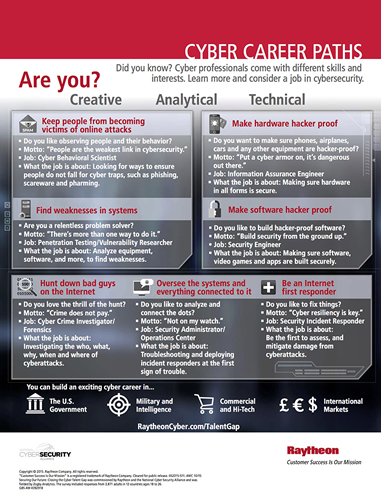Campus Security Awareness Campaign 2017
This post is part of a larger campaign designed to support security professionals and IT communicators as they develop or enhance their security awareness plans. View all 12 monthly blog posts with ready-made content by visiting www.educause.edu/securityawareness.
Campus information security professionals have a unique opportunity to help prepare students who are contemplating a career in cybersecurity. Following are some ways to help spread the word about potential career paths and internship opportunities that can provide vital hands-on experience as these students get ready to join the workforce.
Get the Word Out
Newsletter or Website Content
The cybersecurity field continues to grow along with the need for new workforce talent. In fact, the 2016 EDUCAUSE Center for Analysis and Research’s study on the higher education IT workforce showed that cybersecurity management skillsets are among those most in demand in higher education today. Most information security jobs require at least a bachelor’s degree, so the knowledge students acquire through degree programs is critical. At the same time, students should be encouraged to seek additional opportunities for professional development and growth, including the following:
- Campus internships. Consider hiring student interns to assist in your institution’s information security department. Interns can offer the department additional staffing resources, and department staff can offer interns real-world experiences and the chance to develop mentoring relationships. For suggested qualifications and responsibilities, see the Information Security Intern Job Description Template.
- Cyber competitions. Institutions with an information assurance or computer security curriculum can participate in regional events hosted by the National Collegiate Cyber Defense Competition. These events give students the chance to hone their practical information security skills, as well as experience working in teams.
- Scholarships. Full-time students pursuing a bachelor or master’s degree in a formal cybersecurity program at colleges and universities selected by the US Department of Homeland Security (DHS) are eligible to receive scholarship grants. In exchange, scholarship recipients will be placed in an internship; they will also be offered a full-time cybersecurity position after graduation with a federal agency (or other organization approved by the National Science Foundation).
- Conferences. Students can take advantage of a plethora of information security conferences held each year. Among them is the Women in Cybersecurity conference, which seeks to recruit, retain, and advance women in cybersecurity. This annual conference brings together students and women in cybersecurity from various industries for knowledge sharing, mentoring, and networking.
- Job fairs. Likewise, students can choose from among numerous job fairs, including the following. DHS hosted its first Cyber and Tech Job Fair in July 2016. The U.S. Department of State maintains a list of job fair websites, including some that require a security clearance. The SANS Institute hosts a CyberTalent Fair — a virtual event for anyone seeking career or job opportunities in cybersecurity. Many campuses also host IT and cybersecurity job fairs, offering advice to students about certifications and connecting graduates or alumni with potential employers.
- Training courses. The DHS National Initiative for Cybersecurity Careers and Studies (NICCS) Training Catalog includes more than 2,000 cybersecurity training courses offered in the US. A handy interactive map quickly shows viewers the number of courses offered in specific locations. Users can also search for training opportunities by keyword, location, specialty area, provider, proficiency level, and delivery method.
- Student associations. The National Cybersecurity Student Association requires a small membership fee, but allows students to network through local and state chapters; learn about opportunities for scholarship, internship, and mentoring; and develop technical and leadership skills as they prepare for the cybersecurity workforce.

Source: STOP. THINK. CONNECT. Raytheon's Cyber Career Paths [https://staysafeonline.org/resource/ncsa-raytheon-study-securing-future-closing-cybersecurity-talent-gap/] infographic
Figure 1. Use this image to support your message.
Social Posts
Note: These are Twitter-ready, meeting the 140-character length restriction.
- Building the Next Generation of #Cybersecurity Professionals, 1 at a Time: http://er.educause.edu/blogs/2015/10/building-the-next-generation-of-cyber-professionals-one-at-a-time #InfoSecJobs #CyberAware
- CyberCorps: Scholarship For Service offers grants & internships for #Cybersecurity students https://www.sfs.opm.gov/ #InfoSecJobs #CyberAware
- Explore the #Cybersecurity training courses currently offered in your city/state: https://niccs.cisa.gov/training/search #InfoSecJobs #CyberAware
- The National #Cybersecurity Workforce Framework is a blueprint for #InfoSecJobs w/ 7 categories: https://niccs.us-cert.gov/training/framework #CyberAware
- Help students test #InfoSec skills in a @NationalCCDC Collegiate Cyber Defense Competition! http://www.nationalccdc.org/ #InfoSecJobs #CyberAware
- We encourage students to join the National #Cybersecurity Student Association (@NCSANCSA): http://www.cyberstudents.org/ #InfoSecJobs #CyberAware
E-Mail Signature
Ask staff members to add a tip to their e-mail signature block and a link to your institution's information security page.
Example:
Jane Doe
Chief Information Security Office
XYZ CollegeInterested in a cybersecurity career? Learn more. [Link "Learn more" to your institution's information security department page or the National Cybersecurity Student Association website.]
Embed or Share Videos
Introduction to Symantec's Cyber Career Connection (5:57 min)
Resources
Share these resources with end users or use them to inform your awareness strategy.
- Use the free National Cyber Security Alliance Cyber Career Paths [https://staysafeonline.org/resource/ncsa-raytheon-study-securing-future-closing-cybersecurity-talent-gap/] infographic (see figure 1).
- Share the brief educational videos above.
- Read the EDUCAUSE Review guest blog, “Building the Next Generation of Cyber Professionals, One at a Time,” and the NCSA guest blog, "Creating the Cybersecurity Workforce We Need" [https://staysafeonline.org/blog/creating-cybersecurity-workforce-need/].
- View and download the NCSA’s Securing Our Future: Closing the Cyber Talent Gap [https://staysafeonline.org/resource/securing-future-closing-cyber-talent-gap/] infographic.
- Find out how you can participate in the Collegiate Cyber Defense Competition (CCDC).
- Learn about the CyberCorps: Scholarship For Service.
- Explore the DHS Cybersecurity Workforce Development Toolkit [https://niccs.cisa.gov/workforce-development/cybersecurity-workforce-development-toolkit#] and Cybersecurity Workforce Portal.
- Read (ISC)2’s article on How to Get into Information Security
- Check out the National Cybersecurity Workforce Framework (a.k.a., the NICE Framework).
- Browse the National Initiative for Cybersecurity Careers and Studies (NICCS) Training Catalog or view the NICCS informational video.
- Attend the Women in CyberSecurity conference.
Brought to you by the Awareness and Training Working Group of the EDUCAUSE Higher Education Information Security Council (HEISC).
© 2017 EDUCAUSE. This EDUCAUSE Review blog is licensed under Creative Commons BY-NC-SA 4.0.
